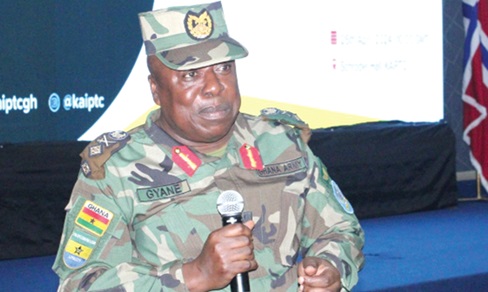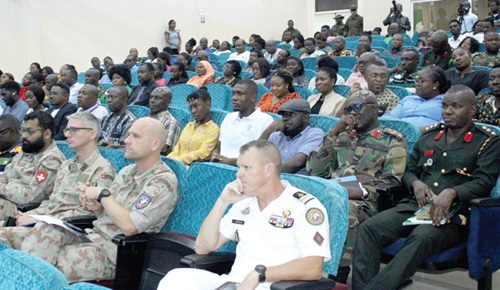
KAIPTC launches 5-year strategic plan
The Kofi Annan International Peacekeeping Training Centre (KAIPTC) has launched a five-year strategic plan (2024-2028) to improve the centre's performance and contribution to the attainment of international peace and security.
Advertisement
The strategic plan comes with innovative programmes aimed at training security persons, diplomats and civilians in varying courses to achieve the governance, peace and security mandates of the United Nations (UN), African Union (AU), Economic Community of West African States (ECOWAS) and other regional economic communities (RECs), as well as civil society organisations (CSOs).
The five-year strategic plan, launched in collaboration with GIZ, a German cooperation agency; and the German and Norwegian governments last Thursday, encompasses seven thematic areas and the corresponding pathways to achieve its overall objective.
The thematic areas in line with the courses to be studied include Peace Operations, Stabilisation and Peacebuilding; Governance, Leadership and Security; Technology and Peace; Women, Youth, Peace and Security; Climate and Environmental Security; Strengthening partnership with Multilateral Institutions and Regional Organisations; and Improving Institutional and Financial Sustainability.
Present at the event were several senior country diplomats, senior military officers, faculty members of the KAIPTC and other dignitaries. Addressing the event, the Commandant of the KAIPTC, Major General Richard Addo-Gyane, said the strategic plan reflected a comprehensive and innovative approach that encompassed training, research, education, policy development and advocacy to respond to the many challenges the world faced.
"The next five years will undoubtedly present us with numerous challenges as our continent and the world face geopolitical tensions, religious and ethnic conflicts, climate change, governance deficits and violent extremism, among others. The KAIPTC recognises the urgency in addressing these issues and strives to be at the forefront of evolving peace-building strategies," he said.
Equip
He added that by equipping key players, including relevant participants, key decision makers, leaders and policymakers with the necessary tools and knowledge, the centre could contribute to the promotion of effective prevention, management, resolution and transformation of conflicts on the continent and beyond.

The launch of the five-year strategic plan
He called for collaboration with partners and agencies to strengthen internal governance systems and resource mobilisation in ensuring the successful implementation of the strategic plan.
Other Trending Stories
"Strong internal structures, a healthy and productive workforce, institutional, financial and technical resources are essential to driving our work forward and expanding our reach. We shall actively seek partnerships and engage with donors, governments and institutions that share our commitment to peace, advocating for increased investment in peace and security initiatives," he said.
Support
The Political Officer at the German Embassy, Pauline Okkens, reaffirmed Germany's continuous support to the centre, stressing that Germany had been a staunch supporter of the KAIPTC since its inception in 2003.
"We will continue to provide the needed support, both financially and technically to the centre's efforts of training the military, police and civilian men and women for even more challenging peace support operations across the world," she said.
She added, "In light of the excellent and long-standing cooperation, we are looking forward to the upcoming agreements on organisational changes and further formalising our role as partners of the centre”.
It was also attended by the Swiss Ambassador to Ghana, Ambassador Simon Giger; the Namibian High Commissioner to Ghana, Selma Ashipala-Musavyi; the Political Officer at the German Embassy, Pauline Okkens; the Diplomat Responsible for Partnership at the Danish Embassy, Morten Vildbrad Kristiansen; the Head of Political and Public Affairs Consular of the Canadian High Commission, Grace Lee; and the Political and Security Advisor of the European Union in Ghana, Marion Segana.




